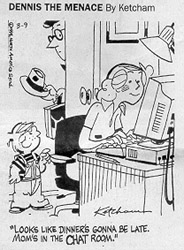

I admit it, I've been fascinated by the idea of community through most of my adult (and almost adult) life. I remember the late sixties and early seventies in the States where it seemed that everyone (or at least all the middle class college students I knew) wanted to join a collective or commune. Maybe it's something that you're supposed to go through and then grow out of, but I've even devoted not a small part of my adult life to realizing the idea of community. And then, when it seemed that the concept had become as out of style as bell bottom jeans, the emergence of cyberspace came along and generated new interest in the concept. Suddenly everyone on the internet was seeking, and perhaps even building, communities.
So it's not only me. The idea of internet usage and community seem to go hand in virtual hand, though just what constitutes an internet community is quite open to debate. A popular book of 1997, for instance, Net Gain, sang the praises of virtual community, yet had, to my mind, a rather strange take on just what the term meant. In an online interview, the authors, John Hagel and Arthur G. Armstrong were asked: What are virtual communities?, and they answered:
And of course another question comes to mind. Can I really be part of a community with "strangers", even if we are "like-minded"? Yes, we may start out as strangers and then grow to know each other and feel close, but though that idealized vision reigns supreme in countless reports on the beauties of the phenomenon, the down to earth truth seems much more banal.
Jakob Nielsen, who writes clear and precise, no-nonsense prose designed for busy people who want to find the information they need quickly on the web says it (as always) well (August, 1997):
 |
What is it that we're looking for in our online
communities?
Somewhat to my surprise, though many cartoons that have come my way relate to online relationships, these are almost always one-to-one relationships, and only very rarely one-to-many, or what might perhaps be called "community". Dennis's mother certainly seems pleased to be in a chat room. Is she chatting with other mothers who prefer to do that rather than to prepare dinner? Does she have a cyberdentity that frees her from the shackles of daily house-wifery? Do she and her companions constitute a community? Probably only until dinner has to be put on the table. |
The statistics seem pretty consistent. About five percent of these "communities" actually have some sort of activity in them. The rest are, on the whole, communities of one, and my guess is that five percent is a significantly higher percentage than what's actually the case. Even if not, it means that about 50,000 people have gone to the effort of setting up a framework for interaction with others around a topic that interests them, and are apparently now waiting for someone to join. It's fair to guess that it would be more productive to simply join someone else's community than to create such immense overkill such that your chances of being found are very limited. But it's a fair guess that part of the idea of "virtual community" is being the rule-maker in your own kingdom. And if that's the case, it's preferable to have a community without members that be compelled to join others and accept their rules.
What do people do in these communities? The technology is actually quite impressive. In addition to discussion forums members can post pictures, develop individual web sections, share a common calendar, and more. Quite honestly, it's a very enticing idea. But though it's a promising framework, from what I've been able to see, it seems that very little interaction actually takes place. Instead, people get on where it's convenient, get off at what seems to them a logical destination, and perhaps establish a bit of eye contact during the ride. There certainly doesn't seem to be any significant commitment toward others that develops, and commitment to my mind is an integral part of community. For the most part, members of virtual communities might as well be riding the subway.
That's it for this edition. Reactions and suggestions can be sent to:
back to the Boidem Contents Page
Return to Communications & Computers In Education - Main Page